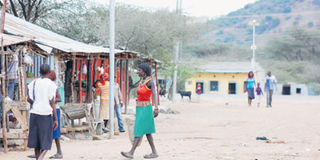Peace slowly returns to volatile North Rift region after long trek

A calm Chemolingot centre, East Pokot, one year after the Kapedo attack where 21 police officers were killed. PHOTO | CHEBOITE KIGEN | NATION MEDIA GROUP
What you need to know:
- Meanwhile, reformed bandits drawn from insecurity-prone areas such as Lomelo, Silale, Kasarani, Lokori, Kamunge, Lochagula, Napeiton, Nasorot and Kapedo, have joined the peace campaigns.
- They include Erupe Long’ole, (Turkana County), Kamket Tolerio (Pokot), Alima Ewoi (Turkana), Mlango Lemeuri (Turkana), Lodiang Long’or (Turkana), Long’ole Kukat (Pokot) and Mlango Lomeuri (Turkana).
- The chairman of the Walk for Peace committee, Prof Elim Lokapel, says insecurity is to blame for perennial food shortages in parts of the North Rift, but he expresses optimism that calm is returning to the region.
Many parts of the conflict-prone North Rift knew no peace last year, with more than 400 people including 19 Administration Police (AP) officers being killed in sporadic acts of rustling and inter-ethnic rivalry. But things are slowly changing for the better.
There has been an uneasy calm this year following months of peace caravans led by leaders, professionals, religious leaders and opinion leaders.
The caravans traversed conflict-prone Baringo, Elgeyo-Marakwet, West Pokot, Trans Nzoia, Samburu, Uasin Gishu and Turkana counties, followed by a Walk for Peace campaign by elite athletes.
The chairman of the Walk for Peace committee, Prof Elim Lokapel, says insecurity is to blame for perennial food shortages in parts of the North Rift, but he expresses optimism that calm is returning to the region.
“We are losing a lot of manpower and development opportunities to insecurity. Every kilometre of the campaign was covered for the sake of peace.
Our leaders should be sincere in these peace and reconciliation efforts. The campaigns are paying off,” he says.
Bishop Cornelius Korir of Eldoret Catholic Diocese said poverty was to blame for runaway insecurity in parts of the North Rift, and asked county governments to initiate alternative income generating activities for pastoralists for sustainable peace.
“Education is another factor that could end cattle rustling. All schools closed as a result of banditry should be re-opened. Other integrated schools bringing together children from warring communities should be set up,” said Bishop Korir.
He called on county governments to set aside budgets for peace building efforts.
Speaking recently during celebrations to mark the end of the Walk for Peace at Lake Bogoria Spa Resort in Baringo, governors Benjamin Cheboi (Baringo), Alex Tolgos (Elgeyo-Marakwet) and Josphat Nanok (Turkana) said they would be at the forefront of peace campaigns.
“Our region sits on enormous resources but these will not be of much help if our people continue engaging in bloody conflicts, which are scaring away investors,” said Mr Cheboi.
Mr Tolgos said pastoralists should be empowered economically to discard retrogressive cultural practices.
He said that this has worked well in Kerio Valley region, where the Red Cross initiated a 200-acre irrigation scheme that is benefiting Marakwet and Pokot communities.
Mr Nanok said, “Turkana County, for instance, has huge oil deposits which will benefit all of us, but we will need roads to reach the market. This will work only in a peaceful environment”.
Athletes in the Walk for Peace campaign took 22 days to cover more than 836km, at the rate of 40km a day. They bore a peace torch which they presented to local governors to facilitate access to the next county.
When the Sunday Nation toured the volatile Kapedo area at the border of Baringo and Turkana counties last week, residents were going about their normal activities, a sharp contrast to the situation last year when many fled their homes.
The Sunday Nation also visited Kapedo shopping centre, about 30km from Chemolingot in Tiaty Sub-County, without police escort.
“The place is safe now; no more attacks and burning of vehicles. We don’t want a repeat of the violence witnessed last year,” said Mr James Kalegeno, former Tiaty MP.
Indeed, residents are now co-existing well, even with the police.
Meanwhile, reformed bandits drawn from insecurity-prone areas such as Lomelo, Silale, Kasarani, Lokori, Kamunge, Lochagula, Napeiton, Nasorot and Kapedo, have joined the peace campaigns.
They include Erupe Long’ole, (Turkana County), Kamket Tolerio (Pokot), Alima Ewoi (Turkana), Mlango Lemeuri (Turkana), Lodiang Long’or (Turkana), Long’ole Kukat (Pokot) and Mlango Lomeuri (Turkana).




